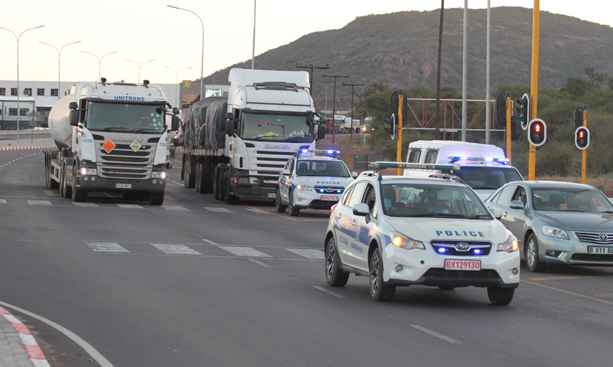
Truckers driving to Botswana or passing through the country are complaining that authorities are denying them a chance to rest or buy food while on their way to delivery points.
Botswana implemented stringent measures to monitor truck drivers coming from other countries after a South African trucker tested positive for COVID-19 last Sunday.
The truck driver entered Botswana through the Tlokweng border from South Africa on Saturday and his results came back positive the following day.
Gaborone was immediately put back on lockdown after recording the new Covid-19 case.
Botswana health officials then published new COVID-19 requirements for truck drivers entering the country which required that they produce a negative COVID-19 test result which was not more than 72 hours old.
This was, however, shortlived as it brought more logistical problems for authorities and the transporters.
Botswana’s Minister of Transport, Thulaganyo Segokgo, confirmed to FleetWatch that the system of testing each truck driver for COVID-19 before being allowed to enter the country has been changed so as to alleviate the huge bottlenecks caused by the testing process.
Truck drivers had to undergo a swab test for COVID-19 on the Botswana side and wait for their results before proceeding to their delivery points.
The delay with the results caused huge queues at the border resulting in authorities reviewing the system.
Minister Segokgo said that although the intention of the swab tests was in line with preventing the spread of coronavirus, the logistics of the process was impractical.
The system has, therefore, been changed whereby a swab test will still be conducted on every driver, but they will no longer have to wait for the test results to arrive.
Instead, the trucks will be escorted by police officials – probably in convoys – to their offload destinations from where they will be handed over to the customer’s SHEA official so as to ensure all COVID-19 prevention protocols are observed during the offloading procedure.
“Once offloaded, the SHEA official will then phone the escort team and the truck will then be escorted back to the border post. The new system will be implemented immediately,” concluded Segokgo.
During the escort, truck drivers have complained about the officials refusing them a chance to rest or even to buy food.
One trucker who spoke to SA Trucker said that the escort refused him to go into a shop to buy food.
“Since they were not allowing us to enter their shops, I asked the officer to go buy food for me but he refused,” said the trucker.
Numerous truck drivers have complained about the treatment they are getting from the escort officials who seem to not care that they are doing essential work just like them.
Police started escorting truck drivers from the border when they are certified to move into Botswana by health authorities but truckers are not amused.
The purpose of police escorting the drivers is to ensure that they go straight to gazetted delivery stations so as to avoid unnecessary stops that can expose the public to danger.
On Wednesday there were problems in one convoy when truck drivers felt that they should be free to move around after being cleared to go ahead into Gaborone.
Truckers complained that they are used to have regular rests in some areas around Tlokweng such as along Choppies-Engen mall road before going back to South Africa.
“The police just expect us to come straight from the border to deliver, drive back to the border and to go back immediately without taking rests as we usually do to reduce fatigue,” said one driver.
“Imagine a truck from Tlokweng border going as far as Maun or Kasane, that will be stretch our resources which are already limited,” hinted a senior police officer.
“Our resources are stretched to the limit, imagine escorting a truck from Tlokweng border to Maun or Kasane and back,” said a senior police officer.
The officer said that officers tried by every way possible to make the trip easier for the truckers but said they were overwhelmed.
Recently posted jobs
-

Ultra-heavy Motor Vehicle Driver | Standerton
Astral - GoldiStanderton -

Ultra-heavy Motor Vehicle Driver | Johannesburg
UnitransJohannesburg -

Warehousing Manager | Durban
BP Durban WarehouseDurban -

Ultra-heavy Motor Vehicle Driver | Springs
DistellSprings -

Code 14 Heavy Duty Driver Wanted | Midrand
Premier FMCGMidrand -

Code 10 Driver Wanted | Sasolburg
Plaas KoopSasolburg -

Ultra-heavy Motor Vehicle Driver Wanted | Pretoria
Admin FoodsPretoria -

Ultra-heavy Motor Vehicle Driver Wanted | Worcester
EpolWorcester











